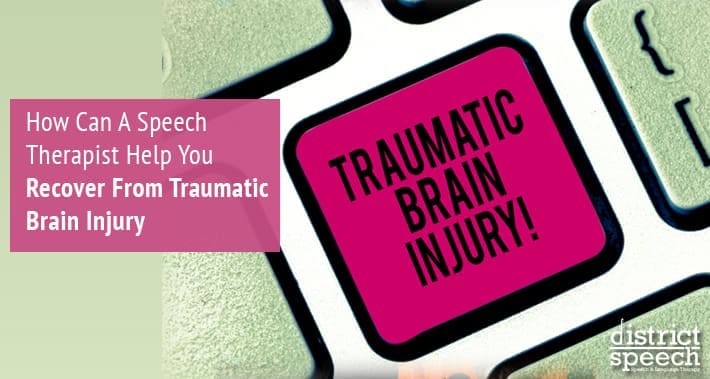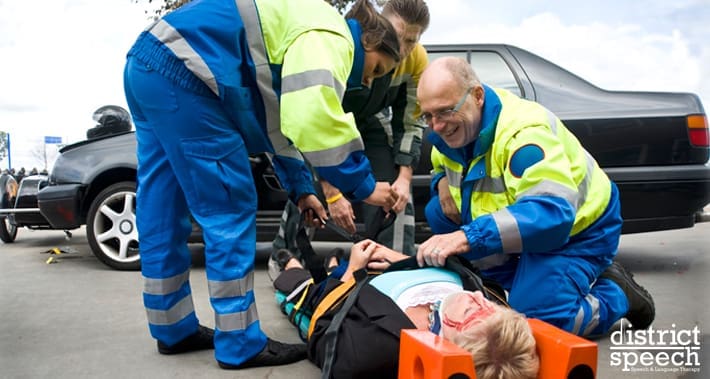
A traumatic brain injury occurs when your brain is physically damaged.
The condition can affect both children and adults alike.
RELATED: Speech Therapy Treatments For Pediatric Traumatic Brain Injury
If you or a loved one has ever been unfortunate enough to experience a traumatic brain injury, you already know how essential speech therapy is in the recovery process.
Adult speech therapists can play an important role in helping you recover from a traumatic brain injury.
RELATED: Speech Therapy For Right Hemisphere Brain Damage
This goes beyond just speech related concerns, though.
At District Speech, we take a holistic approach to your recovery.
One of our Washington DC speech therapists can also work with you to improve your cognitive function, memory, problem solving, and even social skills.
But what exactly is a traumatic brain injury?
And how specifically can a speech therapist help?
Let’s find out.
What Is Traumatic Brain Injury?
A traumatic brain injury is a brain injury that results from some sort of physical trauma.
This includes bumps or blows to the head as well as even more invasive instances, such as when an object penetrates the skull and brain.
The damage to your brain happens instantly, but many of the symptoms, such as seizures or brain swelling, take time to develop.
RELATED: Speech Therapy For People With Epilepsy
Other examples include challenges with speech, language, thinking, swallowing, and learning impairments.
These are problems that will most likely affect your day to day life, and something that speech therapy can help with.
What Are The Signs Of A Traumatic Brain Injury?
Brains are incredibly important for a wide variety of functions.
So, unsurprisingly, the signs of a traumatic brain injury may widely vary.
The type and severity of your symptoms will depend on the severity of the injury and the location of injury in your brain.
Some examples include:
- Sensory problems, such as sensitivity to lights, sound, touch, changes in vision, and tinnitus
- Behavioral changes, such as feeling more emotional, anxious, angry, depressed, or having mood swings
- Social communication issues, such as difficulty following conversational rules like not interrupting or understanding nonverbal cues
- Swallowing problems, such as trouble chewing, coughing, or choking while you eat
- Physical challenges, such as headaches, dizziness, vomiting, vertigo, muscle weakness, and fainting
- Thinking challenges, such as difficulty with memory, paying attention, and retaining new information
- Speech and language challenges, such as problems being understood due to weak speech muscles, controlling your speech muscles, understanding what others are saying or what you read, and memory challenges trying to recall words
What Causes A Traumatic Brain Injury?
Traumatic brain injuries occur for a wide variety of factors.
Common traumatic brain injury causes result from:
- Car accidents
- Falls
- Being hit or running into an object
- Violent assaults
- Near drowning experiences which deprive your brain of oxygen
Sports and military combat related injuries are also common causes of traumatic brain injuries.
If you’ve had a traumatic brain injury in the past, you’re more likely to experience another in the future.

Speech Disorders Associated With Traumatic Brain Injury
Your brain controls your speech.
Subsequently, there are a number of speech disorders associated with traumatic brain injuries.
As a result, you will most likely be working with a team of healthcare professionals to help you recover.
Speech therapists form a vital part of this team and focus on your recovery as it pertains to your speech disorders.
The speech therapy goals for a traumatic brain injury go beyond just language.
Therefore, your speech therapist will also focus on the muscles of your face, throat, and mouth as well as your cognition, speech, and memory.
Now, let’s explore some common speech disorders associated with traumatic brain injuries and how your speech therapist can help you work towards recovery.
1. Memory Difficulties
Speech therapists pay close attention to their clients’ memory skills.
RELATED: A Speech Therapist’s Role In Dealing With Dementia
Your memory is vital for your ability to speak and communicate.
It’s also something that can be easily affected by a traumatic brain injury.
Your speech therapist will introduce memory aids to help you build language.
These aids can be anything, such as a memory log, a calendar, a documented schedule, or a log of important numbers.
Training focuses on teaching you to work with these tools in order to build your memory, which will positively affect your language competency.
2. Attention Difficulties
Like memory, attention is a key component of communication.
RELATED: Communication Deficits In Adults
A traumatic brain injury may affect your attention span and short term memory, which in turn makes it more challenging to process new information.
According to a 2002 paper by Stierwalt and Murray, traumatic brain injuries are associated with multiple different forms of attention impairments.
Fortunately, your speech therapist can help with these challenges as well.
Your speech therapist can create strategies to plan and organize your thoughts so that you can improve your cognitive processing.
One strategy for this includes learning the steps required to complete a task and being able to recall the proper sequence of the steps.
Your speech therapist will include these goals so that you can return to your daily life as much as possible.
3. Social Skills Difficulties
A traumatic brain injury can result in requiring that you learn new ways to keep up with conversations.
A 2004 study by Aubert et al. found that brain injury patients often experience difficulties with their nonverbal communication skills.
Specifically, it may be challenging for you to interpret nonverbal signals like body language and facial expressions.
It may also be a challenge for you to show facial expressions while speaking or to adjust your voice to show the desired emotional effect, like surprise or anger.
Your speech therapist can teach you to compensate with facial expressions, eye contact, and gestures in order to improve your communication.
Group exercises can be useful here to build these language skills in a social setting.
4. Dysarthria
Dysarthria is when there is damage to the nerves in your brain that control your muscles.
Often, you may slur your words or speak very slow and softly; almost like mumbling.
Your speech therapist’s work here is to improve your speech so that you can speak intelligibly and will create exercises to:
- Coordinate your lip and tongue movements
- Increase muscle strength in your mouth, jaw, tongue, and throat
- Improve your breath support
5. Apraxia Of Speech
Apraxia of speech is when you have difficulty with particular sounds and syllables during speech.
Often, you will know what you want to say, but have trouble forming the words and placing them in the correct sequence.
Childhood apraxia of speech is the most common type, but it can occur in adults as well as a result of a traumatic brain injury.
This is known as acquired apraxia of speech.
Your speech therapist can help you by creating exercises to slow your rate of speech and pronounce words correctly.
Sometimes, an AAC system is necessary in certain cases.
Your speech therapist will teach you to use it effectively.
RELATED: Understanding AAC For Nonverbal Autistic Children
Book Your Appointment With District Speech Today
As you can see, speech therapy is a great resource to help you recover from a traumatic brain injury.
This goes beyond just language.
Your speech therapist will also work with you to develop any skills that may have been damaged due to the injury.
This extends to memory, general cognitive function, problem solving, and even successfully interpreting social cues.
The earlier you begin therapy after an injury, the greater your chances for success.
We even offer the option to attend speech therapy from the comfort of your own home.
Book your appointment today with District Speech to get started and schedule an evaluation.
We look forward to working with you.
Book your appointment with District Speech today to get the tools you need to recover from a traumatic brain injury.
1300 I St NW, Suite 400 E,
Washington, DC 20005
- https://g.page/districtspeech
District Speech and Language Therapy specializes in speech therapy, physical therapy, and occupational therapy solutions, for both children and adults, in the Washington D.C and the Arlington Virginia areas.